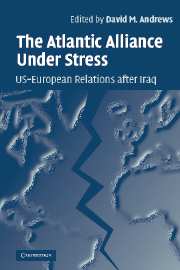Book contents
1 - Toward transatlantic drift?
Published online by Cambridge University Press: 22 September 2009
Summary
The Cold War years are nowadays sometimes seen as a golden period in American–west European relations. There is of course some truth to this assessment, since NATO was in many ways a stunning success. Yet it bears pointing out that crises were a nearly constant feature of the NATO relationship even during the Cold War, so in that sense one might argue that there has never really been a golden period in the Atlantic relationship. Strangely enough, September 11 may have represented the climax of Atlantic cooperation. For the first time, NATO invoked its famous Article 5. Everybody had always assumed this would happen over some crisis in Europe; now it was invoked to show unlimited solidarity with the United States. But this was not to last.
The following chapter, by Elizabeth Pond, describes in some detail the events leading up to the transatlantic crisis of 2002–3 and developments in its immediate aftermath. Here I am going to take a longer view, placing these events in historical context. Taken as a whole, the diplomacy in the run-up to the war in Iraq suggests a fundamental break with the practice of the preceding fifty years. Previously, especially in the most serious crises, France in the end sided with Washington on critical matters: German rearmament, Berlin, Cuba, to a lesser extent Afghanistan and Poland in the early 1980s, and the 1990–1 Gulf War.
- Type
- Chapter
- Information
- The Atlantic Alliance Under StressUS-European Relations after Iraq, pp. 9 - 29Publisher: Cambridge University PressPrint publication year: 2005
- 3
- Cited by

